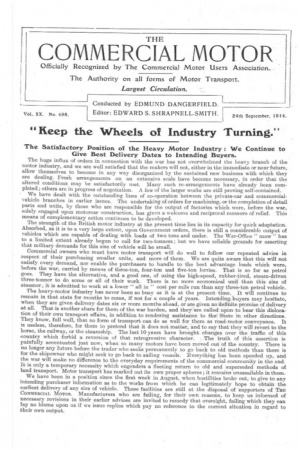Keep the Wheels of Industry Turning."
Page 1

If you've noticed an error in this article please click here to report it so we can fix it.
The Satisfactory Position of the Heavy Motor Industry : We Continue to Give Best Delivery Dates to Intending Buyers.
The huge influx of orders in connection with the war has not overwhelmed the heavy branch of the motor industry, and we are well satisfied that the makers will not, either in the immediate or near future, allow themselves to become in any way disorganized by the sustained new business with which they are dealing. Fresh arrangements on an extensive scale have become necessary, in order that the altered conditions may be satisfactorily met. Many such re-arrangements have already been completed; others are in progress of negotiation. A few of the larger works are still proving self-contained. We have dealt with the outstanding lines of co-operation between the private-car and commercialvehicle branches in earlier issues. The undertaking of orders for machining, or the completion of detail parts and units, by those who are responsible for the output of factories which were, before the war, solely engaged upon motorcar construction, has given a welcome and reciprocal measure of relief. This means of complementary action continues to be developed.
The strength of the British motor industry at the present time lies in its capacity for quick adaptation. Absorbed, as it is to a very large extent., upon Government orders, there is still a considerable output of vehicles which are capable of dealing with loads of two tons and under. The War-Office " maw" has to a limited extent already begun to call for two-tonners ; but we have reliable grounds for asserting that military demands for this size of vehicle will be small.
Commercial owners who must have motor transport will do well to follow our repeated advice in respect of their purchasing smaller units, and more of them. We are quite aware that this will not satisfy every demand, nor enable the purchasers to handle to the best advantage loads which were, before the war, carried by means of three-ton, four-ton and five-ton lorries. That is so far as petrol goes. They have the alternative, and a good one, of using the high-speed, rubber-tired, steam-driven three-tonner to do some or all of their work. There is no more economical unit than this size of steamer, it is admitted to work at a lower " all in " cost per mile run than any three-ton petrol vehicle.
The heavy-motor industry has never been so busy as it is at the present time. It will continue to remain in that state for months to come, if not for a couple of years. Intending, buyers may hesitate, when they are given delivery dates six or more months ahead, or are given no definite promise of delivery at all. That is another share for them of the war burden, and they Are called upon to bear this dislocation of their own transport affairs, in addition to rendering assistance to the' State in other directions. They know, full well, that no form of transport can do as well for them as road-motor conveyance. It is useless, therefore, for them to pretend that it does not matter, and to say that they will revert to the horse, the railway, or the steamship. The last 10 years have brought changes over the traffic of this country which forbid a reversion of that retrogressive character. The truth of this assertion is painfully accentuated just now, when so many motors have been moved out of the country. There is no longer any future before the trader who seeks permanently to go back to old methods than there is for the shipowner who might seek to go back to sailing vessels. Everything has been speeded up, and the war will make no difference to the everyday requirements of the commercial community in the end. It is only a temporary necessity which engenders a fleeting return to old and superseded methods of land transport. Motor transport has marked out its own proper spheres; it remains unassailable in them.
We have been in a position since the first week in August, when hostilities broke out, to give to any intending purchaser information as to the works from which he can legitimately hope to obtain the earliest delivery of any size of vehicle. These facilities are still at the disposal of supporters of THE COMMERMAL Moron. Manufacturers who are failing, for their own reasons, to keep us informed of necessary revisions in their earlier advises are invited to remedy that oversight, failing which they can lay no blame upon us if we issue replies which pay no reference to the current situation in regard to their own output.




















